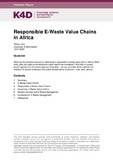Responsible E-Waste Value Chains in Africa
Abstract
Population growth, increasing prosperity and changing consumer habits globally are increasing demand for consumer electronics. Further to this, rapid changes in technology, falling prices, increased affordability and consumer appetite for new products have exacerbated e-waste management challenges and seen millions of tons of electronic devices become obsolete. This rapid literature review collates evidence from academic, policy focussed and grey literature on e-waste value chains. The report should be read I conjunction with an earlier report on e-waste management.
E-waste is any electrical or electronic equipment, including all components, subassemblies and consumables, which are part of the equipment at the time the equipment becomes waste. When e-waste is collected and treated formally, it normally includes the following steps: Collection, Sorting and disassembly, Size reduction, Separation.
The following five pillars of a sustainable e-waste management system have been identified:
• Business and finance
• Policy and regulation
• Technology and skills
• Monitoring and control
• Marketing and awareness
As such, to support the development of a responsible e-waste value chain, the following elements must be addressed.
• Understanding how e-waste is currently managed
• There is no one-size-fits all solution to building a robust e-waste management system based on extended producer responsibility.
• An e-waste system built without a participatory approach is likely to be hampered by a series of issues.
• An overarching policy is necessary
• The choices made for the sector should be founded on two crucial elements – data from on the ground, and inputs from stakeholders.
• Enforcement is incumbent on the government mandate
The push towards a circular economy has provided stakeholders across the value chain with an impetus to initiate systemic improvements and invest in infrastructure and awareness raising.
Citation
Avis, W. (2022). Responsible E-Waste Value Chains in Africa. K4D Helpdesk Report No. 1074. Institute of Development Studies. DOI 10.19088/K4D.2022.015DOI
10.19088/K4D.2022.015Is part of series
K4D Helpdesk Report;1074Rights holder
© Crown copyright 2022Sponsor
FCDO (Foreign, Commonwealth and Development Office)Collections
- K4D [937]

